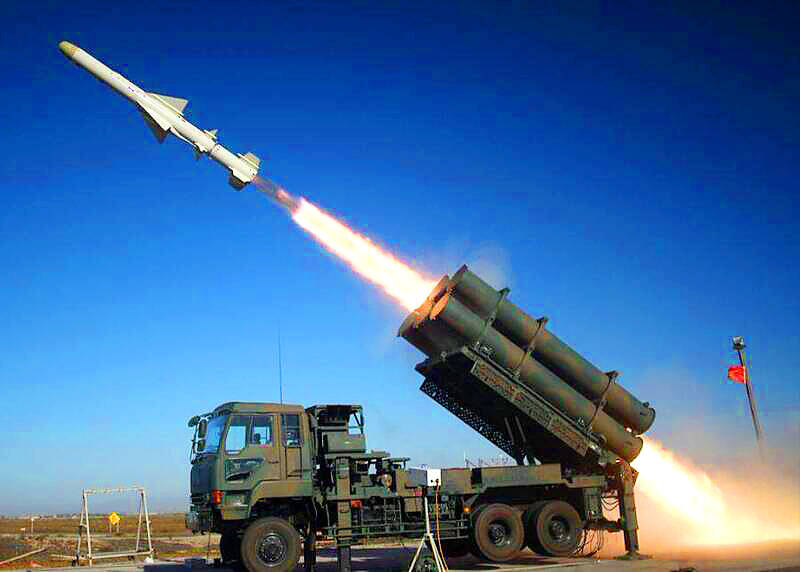Japan is obtaining anti-ship missile capabilities that could place Chinese People’s Liberation Army vessels near Taiwan under crossfire if Japan joins forces with Taiwan, a defense official said yesterday.
The comment came a day after Jiji Press reported that the Japan Ground Self-Defense Force in June is to conduct target practice exercises with land-based anti-ship missiles on Japanese soil for the first time.
Speaking on condition of anonymity, the defense official said the Type-88 and the newer Type-12 surface-to-ship missiles formed the mainstay of Japanese ground forces’ land-based anti-ship capabilities.

Photo: Screen grab from Japanese Ministry of Defense’s Web site
The older system has a range of between 120km and 150km, and the latter based on improvements to its predecessor has an effective range of more than 200km.
Japan is developing extended-range variants of the Type-12, they said.
The “phase one” variant has a planned range of 900km and “phase two” variant has a planned range of 1,200km, the official said.
Should these capabilities come online, the Japanese armed forces would be in a position to add significantly to Taiwan’s deterrence against Chinese aggression, they said.
Cape Irizaki on Yonaguni, Japan’s westernmost point, is 120km from Taiwan.
Taiwan’s principal land-based anti-ship systems are the surface-launched versions of the Hsiung Feng II, extended-range Hsiung Feng II, and Hsiung Feng III missiles.
The standard Hsiung Feng II has an engagement range of 148km.
The extended-range variant of the missile, which is known to possess advanced counter-electronic warfare measures, is estimated to be able hit targets somewhere between 160km and 200km away.
The Hsiung Feng III is said to have a 150km to 200km standard engagement range and a 250km maximum range.
The extended range variant of the Hsiung Feng III that is under development is rumored to have a striking range of up to 400km.
The land-based Harpoon anti-ship missile being procured from the US is said to have an effective range of 148km, however this figure cannot be verified with publicly available information.

DEFENSE: The National Security Bureau promised to expand communication and intelligence cooperation with global partners and enhance its strategic analytical skills China has not only increased military exercises and “gray zone” tactics against Taiwan this year, but also continues to recruit military personnel for espionage, the National Security Bureau (NSB) said yesterday in a report to the Legislative Yuan. The bureau submitted the report ahead of NSB Director-General Tsai Ming-yen’s (蔡明彥) appearance before the Foreign and National Defense Committee today. Last year, the Chinese People’s Liberation Army (PLA) conducted “Joint Sword-2024A and B” military exercises targeting Taiwan and carried out 40 combat readiness patrols, the bureau said. In addition, Chinese military aircraft entered Taiwan’s airspace 3,070 times last year, up about

The Overseas Community Affairs Council (OCAC) yesterday announced a fundraising campaign to support survivors of the magnitude 7.7 earthquake that struck Myanmar on March 28, with two prayer events scheduled in Taipei and Taichung later this week. “While initial rescue operations have concluded [in Myanmar], many survivors are now facing increasingly difficult living conditions,” OCAC Minister Hsu Chia-ching (徐佳青) told a news conference in Taipei. The fundraising campaign, which runs through May 31, is focused on supporting the reconstruction of damaged overseas compatriot schools, assisting students from Myanmar in Taiwan, and providing essential items, such as drinking water, food and medical supplies,

A magnitude 4.3 earthquake struck eastern Taiwan's Hualien County at 8:31am today, according to the Central Weather Administration (CWA). The epicenter of the temblor was located in Hualien County, about 70.3 kilometers south southwest of Hualien County Hall, at a depth of 23.2km, according to the administration. There were no immediate reports of damage resulting from the quake. The earthquake's intensity, which gauges the actual effect of a temblor, was highest in Taitung County, where it measured 3 on Taiwan's 7-tier intensity scale. The quake also measured an intensity of 2 in Hualien and Nantou counties, the CWA said.

STRICTER ENFORCEMENT: Taipei authorities warned against drunk cycling after a sharp rise in riding under the influence, urging greater public awareness of its illegality Taipei authorities have issued a public warning urging people not to ride bicycles after consuming alcohol, following a sharp rise in riding under the influence (DUI) cases involving bicycles. Five hundred and seven people were charged with DUI last year while riding YouBikes, personal bicycles, or other self-propelled two-wheelers — a fourfold increase from the previous year, data released by the Taipei Police Department’s Traffic Division showed. Of these, 33 cases were considered severe enough to be prosecuted under “offenses against public safety,” the data showed. Under the Road Traffic Management and Penalty Act (道路交通管理處罰條例), bicycles — including YouBikes and other